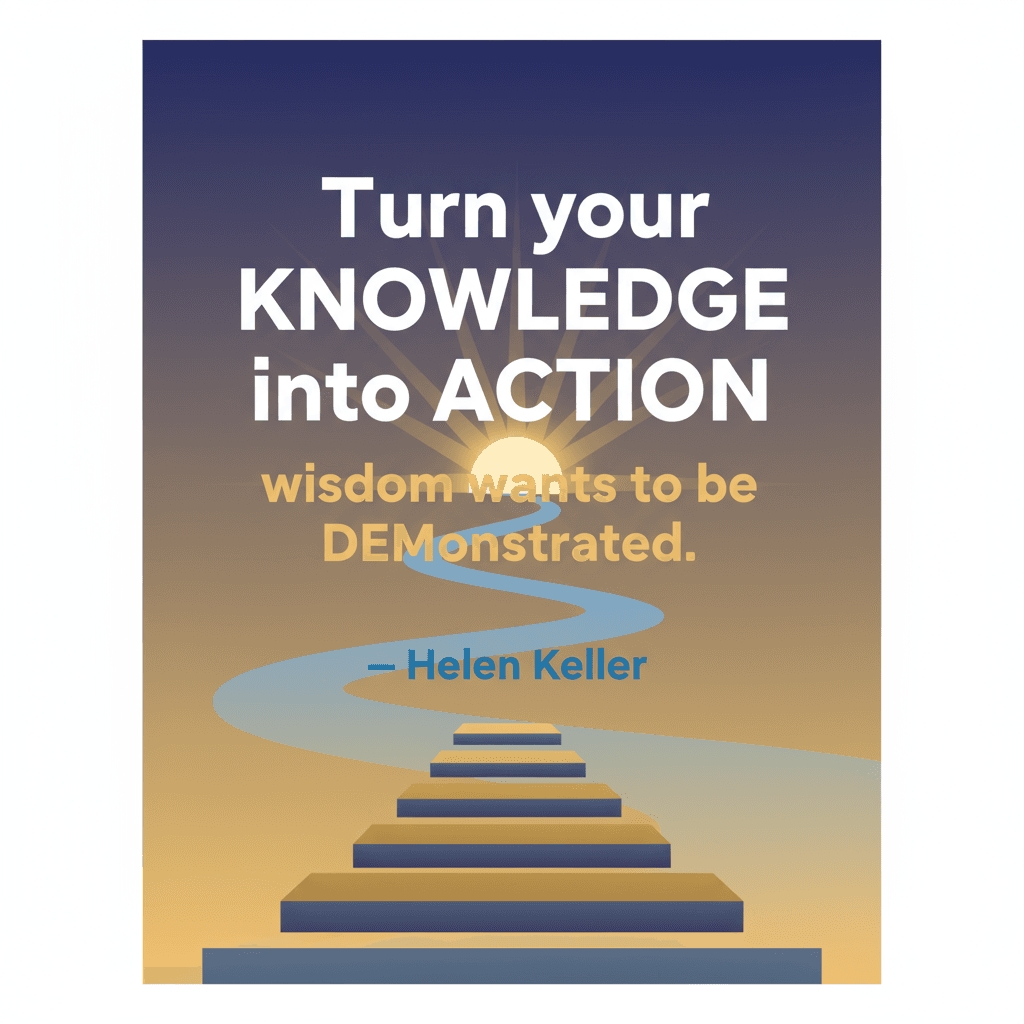Wisdom Demands Action: Knowledge Made Visible

Turn your knowledge into action; wisdom wants to be demonstrated. — Helen Keller
—What lingers after this line?
One-minute reflection
Where does this idea show up in your life right now?
From Knowing to Doing
Helen Keller’s imperative reframes knowledge as potential energy that only wisdom can release. Information may refine our opinions, yet wisdom insists on outcomes—on choices, behaviors, and consequences that can be seen and tested. In this view, demonstration is not a performance but a proof of understanding under real conditions. When ideas meet constraints, ambiguity, and other people, they either clarify or collapse, and that crucible is where wisdom takes shape. Consequently, the question shifts from What do you know? to What has your knowing changed? This pivot invites accountability and invites courage. To see how this plays out beyond abstraction, Keller’s own life offers a living blueprint.
Helen Keller’s Living Proof
Keller’s breakthrough at the pump in 1887—when Anne Sullivan spelled water into her hand—did not end with comprehension; it began a life of application. The Story of My Life (1903) recounts how language unlocked purpose, leading her to public advocacy for education, disability rights, and equitable opportunity. Her influence did not rest on insight alone but on sustained work that translated compassion into institutions and policies. Thus, the quote reads like autobiography condensed into counsel: begin where you are, then let results—literacy gained, doors opened, lives improved—be the argument. From biography, we can now trace the philosophical roots of this demand for enactment.
Practical Wisdom, Old and Enduring
Aristotle’s Nicomachean Ethics (Book VI) distinguishes phronesis—practical wisdom—from mere cleverness; it is right reasoning aimed at right action. Confucius likewise ties knowledge to conduct, urging learners to practice what they claim to understand (Analects, early passages on ritual and virtue). Even religious aphorisms align: by their fruits you will know them (Matthew 7:16) grounds character in observable outcomes. Carried forward, these traditions converge on a test: does understanding reliably guide choices that promote flourishing? If not, the remedy is not louder claims but better practice. This prepares the ground for modern philosophies that judge ideas by their consequences.
Pragmatism and the Proof of Consequences
William James’s Pragmatism (1907) argues that the meaning of an idea lies in its practical cash value—in the differences it makes when lived. John Dewey’s How We Think (1910) expands this into a cycle of inquiry: define a problem, hypothesize, act, observe, and revise. Science operates similarly; claims must survive replication, not just rhetoric. Therefore, Keller’s line is not a motivational slogan but a methodological standard. If knowledge matters, it should steer action; if action misses the mark, knowledge must be refined. This reciprocal motion—from insight to experiment and back—points us toward methods for making wisdom habitual.
Designing the Bridge from Insight to Action
Translating knowing into doing benefits from structure. Implementation intentions—if–then plans studied by Peter Gollwitzer (1999)—help trigger behaviors at precise cues. Gabriele Oettingen’s WOOP method (2014) adds a realistic constraint check, turning wishful thinking into executable steps. Kolb’s experiential learning cycle (1984) then closes the loop: act, reflect, abstract, and test again. For example, after learning about cognitive bias, schedule a weekly bias audit—red-team a decision, run a blind review, or A/B test assumptions. The moment a practice exists, feedback can find it. With tactics in place, the moral dimension of action comes into sharper focus.
Accountability, Humility, and Ethical Feedback
Because action affects others, wisdom must be answerable to outcomes. Medical ethics captures this in do no harm, while Karl Popper’s call for piecemeal social engineering (The Open Society and Its Enemies, 1945) favors reversible, testable changes over grand but risky schemes. Humility keeps the learner attentive to unintended effects, and accountability ensures revisions follow swiftly. In this light, demonstrated wisdom is not bravado but openness to correction. Failures become data rather than excuses, just as successes become responsibilities to maintain. Having framed the ethos, the final step is pragmatic: begin now and make the results visible.
Where to Start, Today
Pick one piece of knowledge you trust. Define the smallest testable action that would show it makes a difference. Set a short deadline, run the test, and publish the outcome—notes, code, lesson, or protocol—for critique. Then iterate. Eric Ries’s build–measure–learn loop (The Lean Startup, 2011) offers a simple scaffold. Whether it is a classroom practice, a workplace process, or a civic effort, the sequence is the same: enact, observe, refine. In doing so, you honor Keller’s charge and join a lineage that treats wisdom not as a claim to be defended, but as a capacity to be demonstrated.